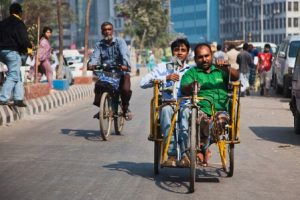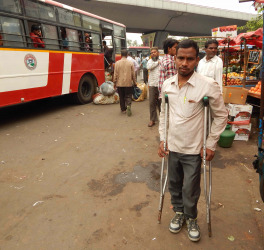Double Pandemic: COVID-19 and People with Disabilities in India
The pandemic provides the government with an opportunity to reorient its health policies toward the disability community.
The COVID-19 crisis has caused untold miseries for disabled people. Globally, 15 per cent (about one billion) of the world’s population is living with some  form of disability according to the World health organization. Additionally, as per the 2011 Census, every 10th household in India has a disabled member. Individuals with disabilities are among the hardest hit by COVID-19 according to the UN. COVID-19 further compounds this situation, particularly for disabled people in vulnerable and non-humanitarian settings. They face lack of reliable knowledge about public health, major obstacles in enforcing basic hygiene measures, and inadequate health facilities.In a rapidly evolving pandemic, information is vital for people in order to make decisions on how to safeguard themselves and how to access essentials and services.
form of disability according to the World health organization. Additionally, as per the 2011 Census, every 10th household in India has a disabled member. Individuals with disabilities are among the hardest hit by COVID-19 according to the UN. COVID-19 further compounds this situation, particularly for disabled people in vulnerable and non-humanitarian settings. They face lack of reliable knowledge about public health, major obstacles in enforcing basic hygiene measures, and inadequate health facilities.In a rapidly evolving pandemic, information is vital for people in order to make decisions on how to safeguard themselves and how to access essentials and services.
Moreover, the majority of people with disabilities (PWDs) rely largely on caregivers (family, friends, or professionals). Since coronavirus is highly contagious, many caretakers hesitate to provide their services. This significantly affects those with mental disabilities, as they cannot be made to exercise or cope with self-isolation. Furthermore, states have been hesitant in providing e-pass facilities to caregivers of disabled people making the situation worse during the lockdown.
State response in such situations must act vigorously to enforce their right to equal healthcare. However, long-term neglect and failure in disability rights and public health have posed significant obstacles to ensure equal protection. Some governments and NGOs are already taking steps to mitigate the impact of the pandemic on disabled people.
For example, Ethiopia is translating COVID-19 messages into local languages, and the country aims to make communication resources available to people with hearing, seeing, and learning disabilities, as well as those with mental illness.
Also Read : Tracking disability is the need of the hour
However, majority of the countries in the world have neglected disabled individuals while formulating guidelines and policies.
Talking from the perspective of India, it lacks a robust pandemic legislation. Currently, the Epidemic Diseases Act, 1897 (EDA), recognises merely and ineffectively the power of each state government to take action, and prescribe temporary regulations for the management of epidemic diseases under Section 2.Moreover, neither the Epidemic Diseases Act, 1897 nor the Disaster Management Act, 2005 specifically address human rights obligations.
In India, PWDs are majorly protected under the Rights of Persons with Disability (RPWD) Act 2016. This Act facilitates disseminating information in an accessible manner (both print and electronic) as well as making government websites accessible. Furthermore, under the International Covenant on Economic, Social, and Cultural Rights (ICESCR) and the Convention on the Rights of Persons with Disabilities (CRPD), it is provided that governments must safeguard the right to information, health, education, and basic living standards. Earlier a little progress was seen on this front. However, sudden instructions for creating such kind of infrastructure still remains far-sighed. In addition to this Section 8 of the Rights of Persons with Disability (RPWD) Act 2016 also specifies for district-wise reports of disabled people and requires district authorities to educate them of their risks during the disaster. However, there are no indications of such efforts being implemented in the country.
While the central government brought out “Comprehensive Disability Inclusive Guidelines for protection and safety of persons with disabilities during COVID-19”, there was little implementation seen on the ground. The above guidelines promised general action points which included disseminating information in an accessible manner, providing essential support, training emergency service provides, etc. However, currently, there is no trace of accessible awareness material (audio-formats and Braille for visually impaired people) on the official site of the Ministry of Health and Family Welfare (MoHFW) for the differently-abled.
Apart from guidelines and policies, central government also came up with numerous financial aid programmes such as the National Social Assistance Programme (NSAP).
Also Read : COVID-19 Pandemic: Lives and Livelihood of CityMakers in Megacities
It announced three months’ pension in advance to help people with disabilities during such troubling time. Under this scheme, Rs 1000 were to be provided for 3 months. This has been quoted as a grossly inadequate amount, which does not take into account the needs of the community. Furthermore, majority of the people are unable to avail benefits under the scheme due to lack of disability certificate, which is a criterion to avail benefits.
 The pandemic provides the government with an opportunity to reorient its health policies toward the disability community. Awareness and dissemination of information are of the utmost importance for combating the pandemic. Print, electronic, social media users, and reporting entities should be informed about and sensitized to the special needs of the elderly and PWD. Information should be disseminated in the form of voice assistance, minimalistic interface, sign language, and other accessible alternatives. Apart from these, alternative arrangements should be made for PWDs who do not have certificates of disability, so that they can access uninterrupted government services.
The pandemic provides the government with an opportunity to reorient its health policies toward the disability community. Awareness and dissemination of information are of the utmost importance for combating the pandemic. Print, electronic, social media users, and reporting entities should be informed about and sensitized to the special needs of the elderly and PWD. Information should be disseminated in the form of voice assistance, minimalistic interface, sign language, and other accessible alternatives. Apart from these, alternative arrangements should be made for PWDs who do not have certificates of disability, so that they can access uninterrupted government services.
As Amartya Sen said “Disabled people are not only the most deprived human beings in the developing world, but they also are the most neglected”. Caregivers of these vulnerable sections must be trained and sensitised as well, as it must be ensured that they do not face any difficulty while reaching out to them. E-passes should be made available freely to caregivers to ensure the well-being of the dependents. A specialised scheme should be formulated to provide financial assistance adequately. It is time for the government and people to concentrate on inclusive and accessible policies.
